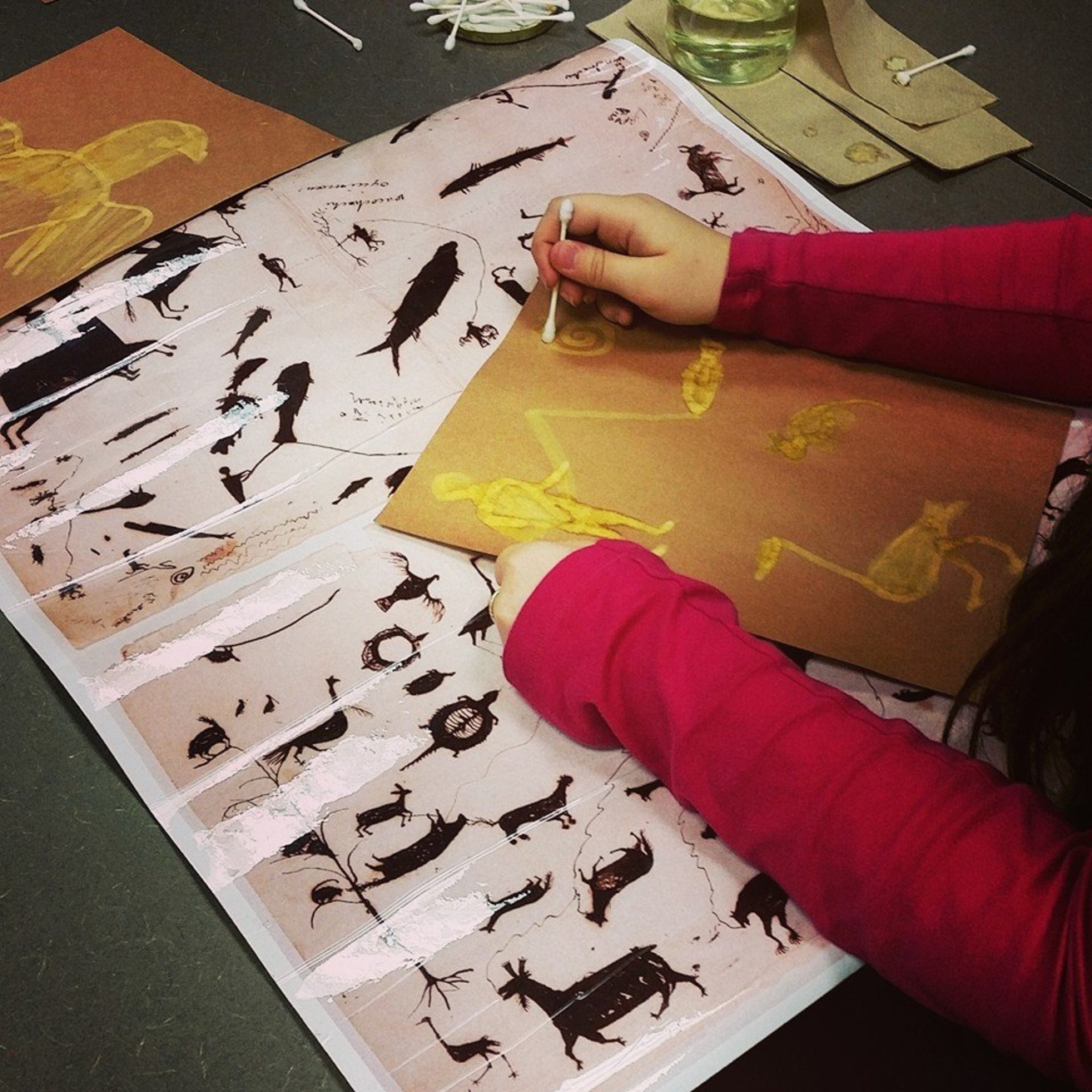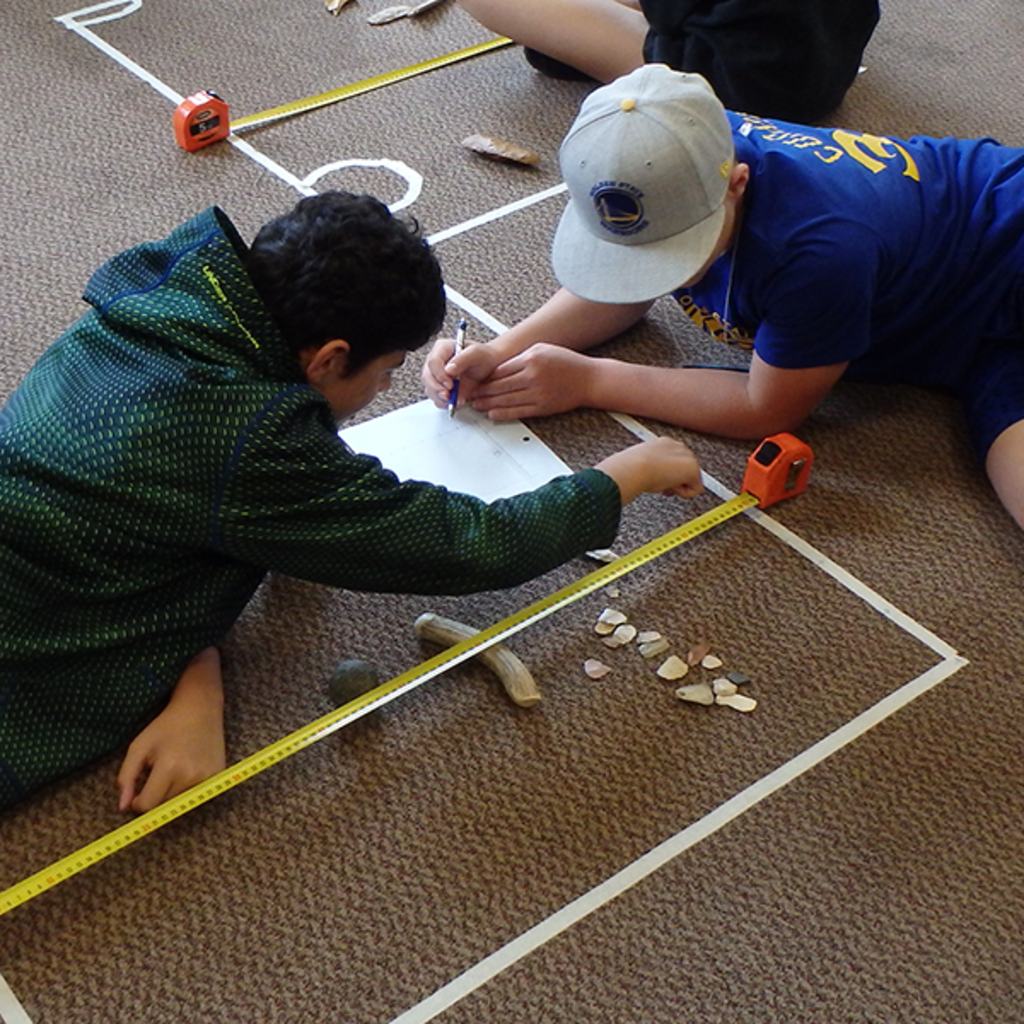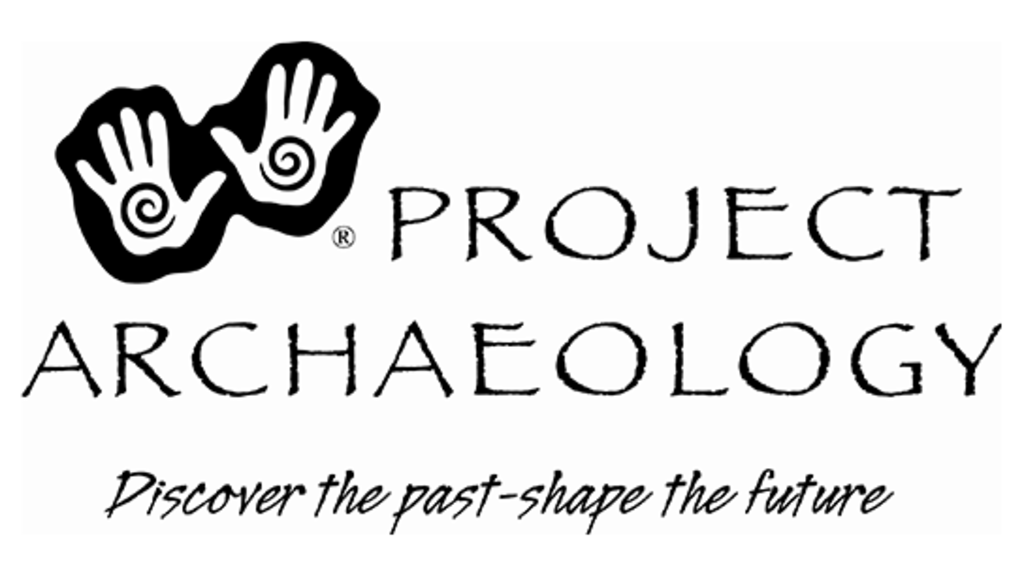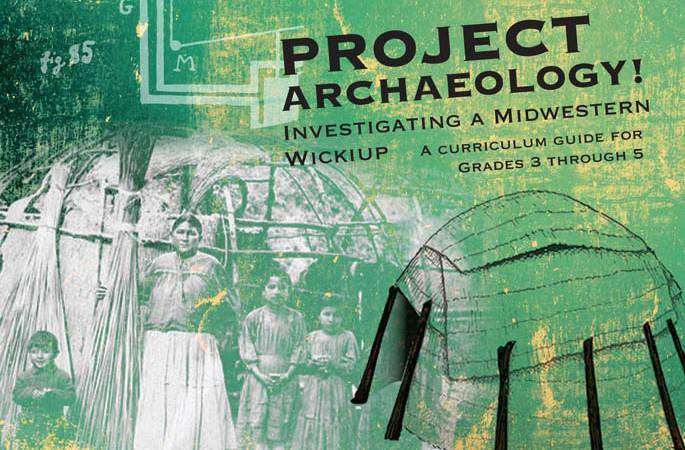
The world’s ancient and historical past is inherently an interesting and adventurous topic for students and all ages. Archaeology is highly multidisciplinary with roots in both the sciences and humanities, which allows children who do not consider themselves to be STEM thinkers to find a way to connect to the science and scientific processes. OSA offers K-12 presentations, teacher workshops, and consulting services, all with a goal of introducing children to the fascinating world of archaeology.
OSA's archaeology education staff have background and credentials in formal and informal education in addition to decades working as archaeologists. We are involved with national education organizations and initiatives, and specialize in training educators and archaeologists to teach archaeology in K-12 settings.
K-12 Presentations

Classroom Programs & Activities
OSA educators develop and present a variety of archaeology and cultural history activities that are interdisciplinary, inquiry-based, hands-on, and customizable for all grade levels based on current classroom content and teacher needs. Our activities are place-based and emphasize what is special about the archaeological, cultural, and environmental history of Iowa and the school’s own community. We also emphasize scientific inquiry skills such observation, inference, and critical thinking. Students gather, organize, and analyze data in order to support their conclusions about the lives, technology, and environments of past peoples.
Unfortunately, our educational programs and activities are unfunded. It is appreciated when schools or communities can contribute to the costs for basic expenses, which include mileage/vehicle and an hourly rate for travel/presentation time. Costs increase with distance from Iowa City, but do not let that discourage an inquiry!
Iowa Archaeology K-12 Program Menu
Ancient Hunting Techniques
The ability of ancient hunters to create and use stone projectile points was integral to survival. About 10,000 years ago and possibly earlier, long before the bow and arrow, Iowa’s earliest hunters used a spear thrower known as an atlatl to increase the speed and force of their spear for more efficient hunting. Projectile points, also known as spear points and arrowheads, also give archaeologists clues to technology, trade networks, chronology, and stone material sources. Students examine and learn about authentic projectile points from throughout Iowa’s prehistory and use an atlatl to throw spears in an appropriate and supervised outdoor setting.
A Walk Back Through Time
People have lived in Iowa for at least 13,000 years, which is about 650 generations. Students visualize this chronology through actively stepping through an archaeological timeline, with each step representing one generation of time. With guidance from the archaeologist, students handle and examine replica and authentic artifacts from each archaeological time period, from the Paleoindian to the historic 19th century. The artifacts signify not only changes in technology and material types, but how past peoples adapted to the land and changed their ways of life throughout time.
Exploring an Archaeological Site
Archaeologists do not just collect cool artifacts, they use scientific methods to study the human past and keep detailed records, maps and photographs of their findings. They use the context of the artifacts as clues to help them determine relationships in time and space. In this activity, students explore a scale mockup of an ancient earthlodge site with real artifacts arranged in the same cultural contexts they might be found in during an archaeological excavation. Students work in small groups to examine and self-interpret portions of the site and propose their ideas about the functions of artifacts and activity areas based on their observations. The groups then combine their knowledge of the site to arrive at an idea of what the entire site represents.
Pleistocene Megafauna and Iowa’s Earliest Residents
This presentation examines Ice Age life in Iowa. Students examine animal skulls and teeth, and they compare ancient megafauna replica skulls with those of modern relatives. Archaeologists also discuss how animals adapted to the Ice Age, how humans hunted them, and what archaeological evidence tells us about life in the Pleistocene epoch.
Precontact Pottery of Iowa
Over 2000 years ago, the invention of pottery revolutionized ancient cooking and food storing techniques. Ceramic technology started out crude, but potters of the past worked to refine and perfect their techniques throughout time. Students learn that ancient peoples had extensive knowledge about how tempering and firing clay affected the strength and quality of their final product. Students also examine the composition and decoration of authentic Iowa potsherds and explore how to recreate the decorations with tools from nature.
Traditional Toys & Games
Traditional toys and games had many purposes and were not meant to be played alone. Games brought people together, stimulated social interaction, strengthened social bonds, and taught skills, patience, and endurance – virtues that would be important in adult life. Students get to challenge themselves by playing some traditional Native American and pioneer-era toys and games and learn that fun and challenging games can be made with simple materials found in nature.
What Do the Bones Tell Us?
Two different activities introduce students to animals bones found in association with archaeological sites. Students learn basics of recognizing different kinds of animal bones and discuss what they can tell us about the lifeways of humans throughout Iowa’s past. One activity allows students to examine animal skulls and teeth to formulate conclusions about animal diet and adaptations and use comparative analyses to investigate relationships between animal families. A second activity has students work together to articulate an actual deer skeleton, discuss how that skeleton could affect knowledge about an archaeological site, and learn the many ways animals remains were used beyond food.
Educator Workshops
OSA educators are trained to facilitate one-hour to multi-day workshops for formal and informal educators on using archaeology in the classroom. We focus on Project Archaeology curricula, as explained below, but are also well-versed in how archaeology applies to state and national standards, STEM education, multiple learning styles, environmental education, and more.
We also do presentations and workshops on teaching about Indigenous cultures, typically with an archaeology focus. We developed our content for this topic with guidance from OSA's Tribal partners; however, we always encourage people seeking knowledge on this topic to learn directly from Indigenous educators if possible.
Trainings for teachers can incorporate one or more of these topics. Costs for teacher workshops will be calculated based on staff time, travel, and workshop materials.

Iowa Project Archaeology
Project Archaeology is a national education program that offers hands-on archaeological experiences for K-12 students. OSA launched the Iowa Project Archaeology program in 2002 and coordinates a variety of professional development courses, institutes, and workshops for Iowa and regional educators.
OSA develops place-based Project Archaeology curricula in collaboration with the national Project Archaeology program, including, Project Archaeology: Investigating a Midwestern Wickiup. This curricular unit is available as a free download, along with 17 other shelter supplements, from the Project Archaeology website to those who have purchased Investigating Shelter.

Curriculum & Evaluation Consultation
Prior to joining OSA's staff, Elizabeth Reetz earned an M.Ed. from the University of Minnesota Duluth (2013). She has experience writing and reviewing standards-based and informal curricula using various pedagogical approaches, as well as conducting curriculum and classroom program evaluations. Elizabeth is in the Science Friday educator collaborative, served as chair of the Society for American Archaeology Public Education Committee for seven years, and helped OSA's K-12 classroom program earn an inaugural Iowa Governor's STEM Advisory Council Seal of Approval.
If you are planning or considering the development of lessons, activities, curricula, or hands-on teaching kits focused on archaeology, we encourage you to reach out to us! There are many misconceptions about both archaeology and Indigenous cultures that perpetuate due to improper research, incorrect or outdated information online, or lack of access to appropriate resources. We are available to contract for all stages of curriculum development, including research, development, review, and/or evaluation.
Additional Resources
Looking for Teaching Resources?
Check out our Teaching Archaeology page to learn about Discovery Trunks and more.
Information & Interactive Media
Many of our digital resources can be used in the classroom.
Help Us Reach Iowa Classrooms
If you know someone willing to make a contribution to help us defray the costs of visiting classrooms across the state, please let them know they can support us with a tax-deductible, charitable donation!